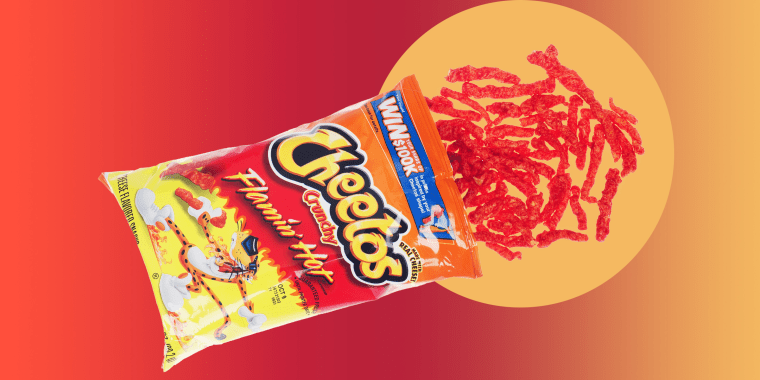The man who claimed to have invented Flamin' Hot Cheetos is finding himself in hot water this week after a new investigative report from the Los Angeles Times claims that he had no part in creating the popular snack.
It's the ultimate rags-to-riches story: Richard Montañez got his start as a janitor at Frito-Lay's Rancho Cucamonga plant and worked his way up to the executive team before retiring in 2019 (all true). Montañez, who claims to have invented Flamin' Hot Cheetos in the 1970s, has become a popular motivational speaker and is set to release his second memoir, "Flamin' Hot: The Incredible True Story of One Man's Rise from Janitor to Top Executive," in June. Eva Longoria is also set to direct a film based on his life with Searchlight Pictures this summer.
Montañez, 62, has asserted that he was the one to pitch the idea for chile-covered Cheetos to a chief executive at the company, but according to the Times report, he wasn't actually the brains behind the spicy snack. The Times interviewed more than a dozen former Frito-Lay employees and consulted archival records before publishing the report over the weekend.
"None of our records show that Richard was involved in any capacity in the Flamin' Hot test market," Frito-Lay wrote in a statement to the Times. "We have interviewed multiple personnel who were involved in the test market, and all of them indicate that Richard was not involved in any capacity in the test market." The company continued, "That doesn't mean we don't celebrate Richard […] but the facts do not support the urban legend."
So, if Montañez didn't invent Flamin' Hot Cheetos, who did? Well, a few people, according to Frito-Lay, including a junior employee in the company — Lynne Greenfield — who was tasked with developing the new brand in 1989 and worked with a team to see it to fruition.
In 2018, Frito-Lay launched an internal investigation when Greenfield reached out to them about Montañez's claims. "It is disappointing that 20 years later, someone who played no role in this project would begin to claim our experience as his own and then personally profit from it," she told the Times.
Frito-Lay, which released the first-ever Cheetos cookbook in November, also shared the following statement with the Times: "We value Richard's many contributions to our company, especially his insights into Hispanic consumers, but we do not credit the creation of Flamin' Hot Cheetos or any Flamin' Hot products to him."
However, the investigation did note that Montañez was involved in the launch of Frito-Lay's Sabrositas product line, which was aimed specifically at the Latino market and included Flamin' Hot Popcorn and Lime and Chile Fritos.
The author, who first started speaking out about his role in the invention of Flamin' Hot Cheetos in the late 2000s, shared a video on his Instagram page on Sunday after the Times published the story.
"I don't care what room you're in, there's always somebody in the room that's going to try to steal your destiny. They may even say you never existed," he said. "I want you to do this: Write down your history, because if you don't, somebody else will. Remember that. And also remember this, the best way to destroy a positive message is to destroy the messenger. Never allow that to happen to you. I'm certainly not going to allow it to happen to me."
In an interview with Variety, Montañez said he has never heard of Greenfield and said he stands by his claims that he invented the popular snack in his own kitchen and garage.
“Frito-Lay had something called the method-improvement program, looking for ideas. That kind of inspired me, so I always had these ideas for different flavors and products,” he said. “The only difference in what I did, is I made the product, instead of just writing the idea on a piece of paper and sending it. They would forward over those products to the appropriate people and I didn’t know, because I was just a frontline worker.”
Montañez said there's no documentation proving he's the inventor and he believes that's because he was working at a lower level in the company at the time.
“Nobody was telling me, ‘This is how executives work.’ I wasn’t a supervisor, I was the least of the least,” he said. “I think that might be one of the reasons why they don’t have any documentation on me. Why would they?”
As for that film that's being made about his life? Well, Montañez said he's "not concerned" about it being spoiled by Frito-Lay's allegations.
“I think that [the film is] going to inspire people to do the right thing. Don’t make the mistake Montañez made. Document everything,” he said. “The story isn’t really about Hot Cheetos. The story is about overcoming adversity and racial discrimination.”
TODAY Food reached out to Montañez's publisher to see if these new claims will affect the release of his latest book "Flamin' Hot: The Incredible True Story of One Man's Rise from Janitor to Top Executive," and Adrian Zackheim, president and publisher of Portfolio Books, said that the publishing house is excited to release the book as scheduled.
"During his 40+ years at Frito Lay, Richard Montanez repeated the story of his involvement with this product hundreds of times, in speeches, books, and media interviews. Only now, just as his book is announced, are we suddenly hearing an alternate narrative about the development of this product, which seeks to diminish Richard’s contribution and to question the details of long-ago events," Zackheim said. "We are proud to stand with our author. Richard Montanez embodies the entrepreneurial spirit; we salute his dedication to inspiring people to own their own stories no matter what their circumstances.”

